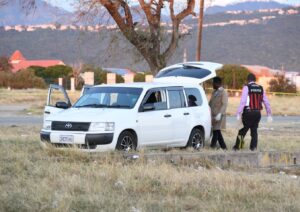
Take heed, lest we become a failed or police State
Jamaica is at a critical crossroads. Things are falling apart. When Jamaicans in the United States of America can say that, despite the many mass shootings in that country — over 400 since the start of the year — they feel safer there than being in their homeland, then that is a telling indictment on the powers that be that we are fast becoming a failing or failed State.
Even as we prepare to celebrate 60 years of political independence, this island paradise can be best described as suffering from some form of national schizophrenia.
Tourism is booming, the business processing sector is on a roll, unemployment is down, our net international reserves are in a healthy state, and our economy at the macro level is fast becoming the envy of small island states among others, and we can go on and on to name the many positives as are repeatedly enumerated by a gloating Andrew Holness Administration. Yet, to put it bluntly, “It sipple out deh!”
Marauding, merciless, seemingly moronic gangsters have the upper hand, while the security forces, already stretched to the limit, in terms of resources, human and otherwise, have to be playing catch-up. Murders are up, more than six per cent that of last year and increasingly we are seeing incidents of armed robberies; major heists involving millions of dollars; scammers are having a field day conning both local and overseas victims out of billions of dollars not to mention our financial institutions; and it can be reasonably argued that no Jamaican feels safe anymore, even if they are ensconced in a gated community and have round-the-clock guard service. Indeed, there is a cynical story going the rounds that the prime minister has had to increase his security detail to include soldiers. If this is true, then we are entering a dark place in our history.
As things get from bad to worse, the country at large and its frantic, sometimes clueless, leaders have been desperately seeking to identify the best solutions to tackle this ongoing crisis.
State minister in the Office of the Prime Minister Homer Davis, who is also a Member of Parliament for St James, where murders have passed the 100 mark and counting, recently went out on a limb, and some would say put his foot in his mouth, when he posited that the government, supposedly the Jamaica Constabulary Force and the Ministry of National Security, should meet with these gangsters in a bid to arrive at some form of treaty or ceasefire.
Almost immediately, National Security Minister Dr Horace Chang summarily dismissed that proposal, declaring that his Jamaica Labour Party (JLP)-led Government would never negotiate with the criminal warlords. Concomitantly, the national schizophrenia reared its ugly head again when Justice Minister Delroy Chuck embraced Davis’s suggestion, pointing to successes he had had in his own St Andrew constituency as a result of “reasoning” with the enemy. What a preckeh!
In the meantime, as the pendulum of desperation swings from the sublime to the ridiculous, some are calling for the return of the hangman. Legal and Constitutional Affairs Minister Marlene Malahoo Forte is insisting that the murderous criminals out there should not be allowed bail too easily, if at all, while others have declared that they would be prepared to give up some of their basic constitutional rights to enable the security forces to go after these miscreants.
Which brings us to the JLP’s chagrin over the fact that the Opposition People’s National Party (PNP) put a spoke in its wheel with respect to the continuation of what was seen as the Andrew Holness Administration’s major crime fighting tool, the contentious state of public emergency.
In all of this, all well-thinking citizens may be forced to wonder if Jamaica is evolving towards becoming a failed State or being forced to become a police State. Author Robert Longley, in a published article on July 27, 2020, described a failed State as “a Government that has become incapable of providing the basic functions and responsibilities of a sovereign nation, such as military defence, law enforcement, justice, education, or economic stability. Common characteristics of failed states include ongoing civil violence, corruption, crime, poverty, illiteracy, and crumbling infrastructure. Even if a State is functioning properly, it can fail if it loses credibility and the trust of the people.” Does this ring a bell? No pun intended!
Wikipedia describes a police State “where the government institutions exercise an extreme level of control over civil society and liberties. There is typically little or no distinction between the law and the exercise of political power by the executive, and the deployment of internal security and police forces play a heightened role in governance. A police State is a characteristic of authoritarian, totalitarian, or illiberal regimes (contrary to a liberal democratic regime). Such governments are typically one-party states, but police-state-level control may emerge in multi-party systems as well”.
There is a Jamaican saying that one should “tek sleep mark death”.
Prime Minister Andrew Holness must of necessity take the bull by the horns in order to wrest this country out of the quagmire in which it has found itself because of 60 years of political ineptitude and ‘bandoolism’. He, more than any other leader at this time, has the social and political capital to make a difference, but there has been some amount of dithering and playing to the gallery.
For starters, the legislative process must be ramped up post-haste so that justice can be effectively administered.
Secondly, as much as prudence and caution, in terms of managing the country’s fiscal affairs, is required in these trying times, he must pay attention to the fact that thousands of Jamaicans are suffering and living hand to mouth. A failing education system has helped to exacerbate this troubling situation as thousands of youth are unemployable and are therefore easily lured into a life of crime. This is a recipe for social upheaval. Something meaningful must be done for the working poor as well as the needy.
Finally, where crime and violence are concerned, get help from the international community, including the Jamaican Diaspora.
The challenges facing this nation will not be solved overnight, but the time has come for bold, incisive, and sustained action which can bring about sustainable and long-lasting results. Needless to say, the blame game will not help, so it behooves the PNP to seek ways and means of assisting the nation in its quest not to become a failed or police State. The writing is on the wall.
Lloyd B Smith has been involved full-time in Jamaican media for the past 45 years. He has also served as a Member of Parliament and Deputy Speaker of the House of Representatives. He hails from western Jamaica where he is popularly known as the Governor. Send comments to the Jamaica Observer or lbsmith4@gmail.com.


























